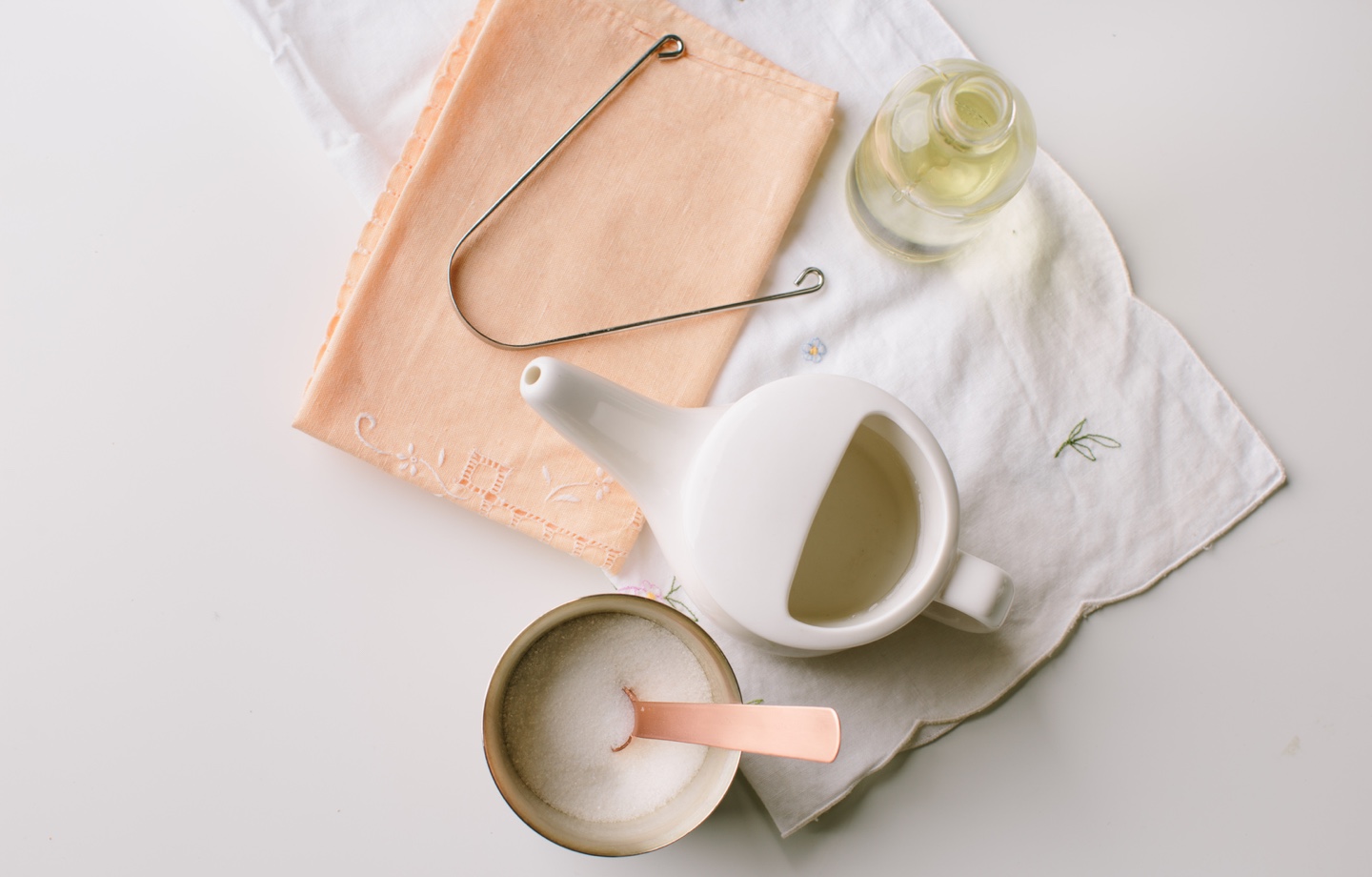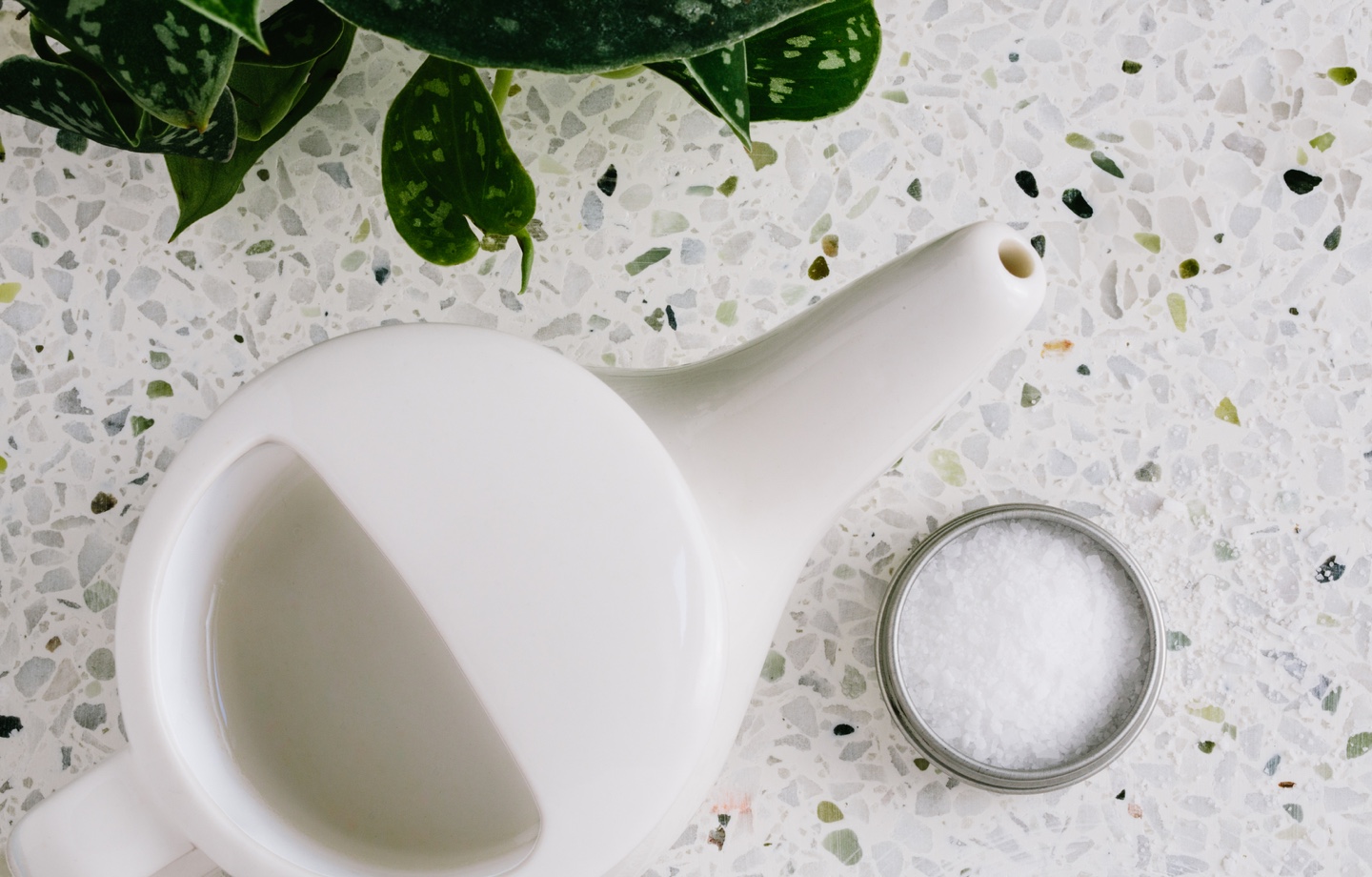When using a nasal irrigation device like the neti pot, proper cleaning and the right water are key to effectiveness and safety.
I was well into adulthood before I even considered using eye drops, so when a friend suggested a nasal rinse to help combat the Pacific Northwest’s spring pollen onslaught, I shuddered and kindly passed. The only saltwater I’d ever had up my nose was from a rogue wave at the beach, and I wanted to keep it that way.
But as climate change causes increased pollen production and longer allergy seasons, and experts continue to greenlight the approach (when used correctly), I decided to dig a little deeper into nasal irrigation. Specifically the teapot-like device, the neti pot.
Is Nasal Rinsing New?
Nasal rinsing, or nasal irrigation, has been around long before Tik Tok or Oprah. (The neti pot was introduced to mainstream consumers in the U.S. in 2007 by ethically questionable celebrity surgeon Dr. Mehmet Oz on The Oprah Winfrey Show). In fact, the practice has its origins in Ayurvedic medicine — an ancient Indian healing concept focused on creating physiological and energetic balance in the body, mind, and spirit. Practitioners use nasal rinsing to help relieve congestion, seasonal and environmental allergy symptoms, and sinus inflammation.
The neti pot, for its part, “shifted from obscure Ayurvedic health device to mainstream complementary and integrative medicine, touted by celebrities and sold widely in drug stores” over the course of the last decade, notes a 2016 National Institute of Health case study exploring how foreign health practices become popular in the U.S. Today, multiple studies report positive outcomes around nasal rinsing, and in 2021, an international panel of experts included rinsing with saline — or saltwater — as one of the most effective treatments for sinus issues.

Read more: How to Create an Allergen-Friendly Home
How Does it Work?
The nose acts as a filtration system, trapping airborne particles like bacteria, viruses, pollutants, and pollutants in the nasal cavities. When there’s a reaction to particles caught in the mucus, it can result in pressure, pain, and congestion. Moving a saline solution through your nasal passages with an irrigation device and pushing water through one nostril and out the other helps flush out particles caught in light mucus, moistens nasal passages, and thins thick mucus.
If you have a cold, flu, or allergies, nasal irrigation can be helpful in removing mucus to help you breathe a bit easier. For chronic issues, more frequent rinsing can stave off inflammation altogether, rather than trying to fight inflammation off once it’s set in. According to UCLA Health, in one study, patients with chronic sinus issues performed a daily nasal rinse and saw an improvement in symptom severity by more than 60 percent. It’s important to note, however, that nasal rinses shouldn’t be used as a preventive measure — the method can affect the protective features of the good mucus and increase the risk of infection.
While you may still need an antihistamine or nasal steroid spray (unlike medication, a rinse doesn’t get to the root of allergies or illness), nasal irrigation can be an effective complementary treatment and is safe to use during pregnancy and for kids over the age of two, ideally with a physician’s signoff.
Read more: Natural Cold Remedies to Use This Season
Is it Safe?
I’ve seen a few troubling headlines over the years about Naegleria fowleri, a parasite that attacks the brain, linked to nasal rinsing. But the consensus among experts is that, when done correctly, the practice is safe and effective.
“Nasal irrigation devices — which include neti pots, bulb syringes, squeeze bottles, and battery-operated pulsed water devices — are usually safe and effective products when used and cleaned properly,” says FDA physician Eric A. Mann, M.D., Ph.D. in an FDA consumer update.
In this case, ‘properly’ means foregoing plain tap water for distilled, boiled, or filtered water that utilizes a 1-micron filter or smaller. Tap water isn’t adequately filtered or treated for organisms like bacteria or amoeba, which can cause serious, even fatal, infections if they reach the nasal passages (drinking tap water doesn’t pose the same risk, as stomach acid provides a line of defense and kills the organisms).
The takeaway? I won’t be giving up my over-the-counter allergy meds anytime soon, but with pollen season intensifying by the year, there’s no harm in having a backup.

Read more: How to Naturally Boost Your Immune System
Have feedback on our story? Email [email protected] to let us know what you think!

Shop Pillows
The Essential Organic Pillow Collection
Gentle, breathable, non-toxic support.







